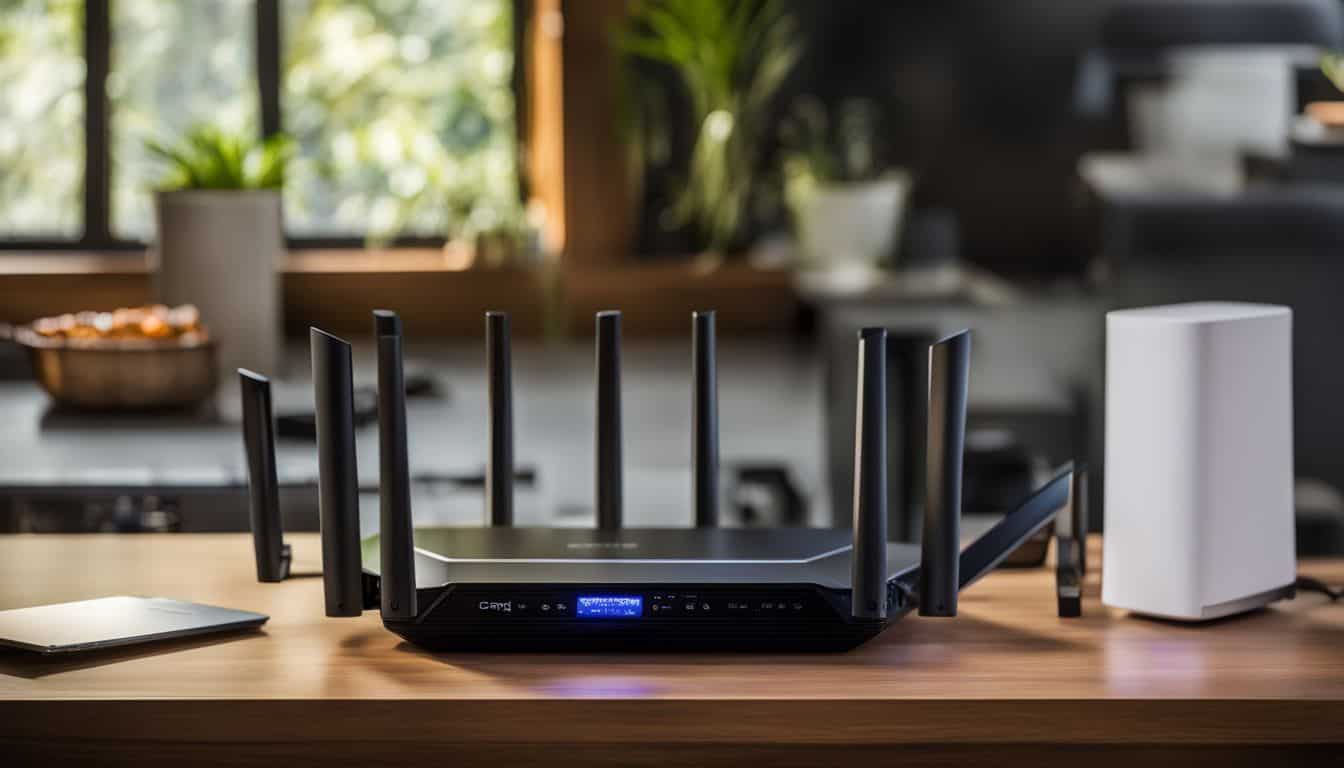
Boost Your Holiday Rental Income with High-Speed Broadband!
Deciding on the best broadband option for your second home or holiday let can be daunting. Even though Internet Service Providers don’t tend to offer plans specifically tailored for this, plenty of suitable options exist!
Broadband for holiday homes is essential for providing guests with a seamless internet connection during their stay. Its also essential to make sure your providers router provides wifi for your holiday home.
This guide will help you through the maze, discussing everything from 30-day rolling contracts to ADSL and fibre options.
Key Takeaways
- Cheap broadband deals are cost-effective for providing internet coverage in second homes or holiday lets, but may not be suitable for heavy internet usage.
- Short-term or no-contract broadband offers flexibility for seasonal or infrequent usage, allowing you to pay only when needed.
- Mobile broadband provides reliable connectivity in both rural and urban areas by connecting to nearby 4G or 5G networks.
Broadband Options for Second Homes and Holiday Homes
There are various broadband options available for second homes and holiday homes, including cheap deals, short-term contracts, mobile broadband, monthly rolling-contract options, and 18-month contracts.
Cheap broadband deals
Cheap broadband deals are an attractive option for homeowners looking to provide internet coverage in their second or holiday homes. These deals often come with a lower speed and monthly price, making it a cost-effective solution, especially for rural properties.
Renowned ISPs like Onestream, Sky Broadband, and BT Broadband are among the top recommended providers for these budget-friendly packages. Do keep in mind, however, that these cheap broadband plans are often well-suited to meet basic browsing needs but may not always be sufficient for heavier internet usage.
You should choose your plan based on how much data you will require during your stay in your second home or holiday let.
Short-term or no-contract broadband
The advantage of short-term or no-contract broadband is its flexibility. It makes an ideal choice for second homes or holiday rentals, where internet usage isn’t required all year round.
Several providers offer temporary internet service options to cater to this market. For instance, BT Internet provides a 6-month contract, perfect for those who are planning extended stays.
Pay-as-you-go plans present another great alternative for temporary broadband connection for vacation home properties. This type of service allows you to only pay for the internet when it’s needed – reducing unnecessary expenses and increasing convenience.
Seasonal homeowners will appreciate the benefits of these short-term broadband solutions in providing cost-effective connectivity when they need it most.
Mobile broadband
Mobile broadband offers a flexible solution for those who need internet at their second homes or holiday properties. Suitable for both rural and urban areas, this option works by connecting to nearby 4G or 5G networks.
Mobile dongles provide an instant connection when plugged into your device and tethering phones even allows you to use your smartphone as a mobile hotspot. Service providers offer different plans including cheap 18-month contracts, contract-free options, and pay-as-you-go data packages which can be tailored based on usage needs.
Whether it’s managing the security system of your property remotely or streaming movies during vacations, mobile broadband ensures reliable connectivity wherever you are.
It’s critical to check local network coverage before investing in any package as speeds vary across locations.
Monthly rolling-contract broadband
Monthly rolling-contract broadband offers a flexible solution for those with second homes or holiday lets. This type of contract allows you to use broadband service every month, without any long-term commitment.
It is particularly ideal for seasonal or infrequent usage, as you can start and stop the service as needed. Not having to commit to an 18-month or longer contract means more freedom to manage costs effectively based on your usage patterns.
There’s no need for laying idle during off-peak seasons or paying for services not fully utilised. Providers like BT Broadband might require additional landline services which could affect your decision-making process while considering various options.
Always compare different providers and deals before choosing the best one to meet your needs.
Cheap 18-month broadband contracts
Cheap 18-month broadband contracts are gaining popularity, especially for individuals seeking affordable options for their second homes and holiday homes. Such long-term deals provide cost-effective internet access, without compromising on service quality.
A slew of providers such as Plusnet, Shell Energy, and TalkTalk offer these budget-friendly packages tailored to fit the needs of different customers. For students or people on certain benefits, special discounted “social tariffs” are available.
The option of switching providers also exists if one is outside their minimum contract period – an effective strategy that may help land a more competitive price. Flexible contracts and student discounts further sweeten these deals making them perfect fits for both temporary accommodations like vacation homes and longer-term residences alike.
Choosing the Best Broadband for a Second Home
Considerations for holiday homes abroad, availability and alternative options, speed requirements, and monitoring and securing Wi-Fi routers all play a crucial role in choosing the best broadband for a second home.
Considerations for holiday homes abroad
Investing in a suitable broadband plan for your holiday home internet abroad, is crucial. It’s not just about providing guests with internet access but also managing online bookings, handling inquiries, and ensuring seamless communication.
Giving priority to high-speed internet can significantly enhance guest experiences and increase booking rates.
The availability of broadband varies greatly from country to country. Always take into account factors like regional coverage of specific providers, local alternatives, and speed requirements based on usage patterns.
If you have security systems or smart devices installed in the property that require stable connections, consider choosing a dedicated line rather than shared or public Wi-Fi networks.
It’s always essential to monitor and secure Wi-Fi routers well – this prevents illicit access without your knowledge.
Availability and alternative options
Broadband availability in second homes depends heavily on location. For city apartments and suburban houses, there’s no shortage of affordable broadband options from providers such as Broadband.co.uk.
If your second home is located in a rural area where traditional services may be limited, consider alternative solutions like mobile internet or wireless broadband. Advancements in 4G and 5G technology make it possible to achieve fast internet access even in remote areas by using a mobile dongle or phone tethering.
It’s essential to evaluate each option carefully for cost-effectiveness, reliability, and speed before making a decision.
Speed requirements
To ensure a smooth and enjoyable broadband experience in your second home, it’s crucial to consider the speed requirements. Slow speeds can cause frustrations when performing online activities like streaming music or browsing social media.
For music streaming platforms like Amazon Music Unlimited, a minimum broadband speed of 0.5 Mbps is recommended. Additionally, everyday internet activities such as browsing the web and sending emails generally require a minimum download speed of 10 Mbps.
So make sure to request a decent broadband service with these speed requirements to fully enjoy your online adventures.
Monitoring and securing Wi-Fi routers
It is crucial to monitor and secure your Wi-Fi router when choosing broadband for a second home. By keeping an eye on your router’s performance, you can ensure a reliable internet connection for all your devices.
Additionally, implementing security measures such as strong passwords and encryption will help protect your network from unauthorized access. With the increasing number of guests and devices in holiday rentals, investing in a robust Wi-Fi router is essential to provide a strong signal throughout the property.
This ensures that everyone can enjoy fast and stable internet connectivity during their stay. Remember to consider these factors when selecting broadband for your second home to guarantee a seamless online experience.

Broadband for Airbnb and Holiday Lets
Discover the best broadband options for your Airbnb and holiday rentals, ensuring seamless internet connectivity for your guests.
Understanding guest needs and usage habits
Guests staying in Airbnb and holiday lets have specific needs and usage habits when it comes to broadband. Internet connectivity is no longer a luxury but a necessity for most people, even during their vacations.
Guests expect reliable WiFi access that allows them to stay connected, whether they’re checking emails, streaming movies, or uploading vacation photos. Accommodations with good broadband are highly sought after because customers demand capable connections during their stay.
Therefore, hosts need to prioritize offering quality internet services as part of the overall guest experience. Additionally, ensuring internet safety by implementing best practices like creating encrypted guest networks is crucial to protect both guests and hosts from potential security risks.
Options for ADSL, fibre, and mobile broadband
You have several options when it comes to broadband for your second home or holiday let. Consider the following:
- ADSL connections: This is a common type of broadband that uses traditional copper telephone lines. It offers decent speeds and is widely available.
- Fibre optic broadband: If you want faster speeds, consider fibre optic broadband. This uses fibre cables to deliver internet, allowing for quicker downloads and uploads.
- Mobile data plans: In remote locations where fixed-line broadband isn’t available, mobile data plans can be a great option. You can use your smartphone’s hotspot feature or invest in a dedicated mobile broadband device.
Setting up and optimizing Wi-Fi reception
To ensure a smooth and reliable internet connection for your Airbnb or holiday let, it’s crucial to set up and optimize the Wi-Fi reception in your property. Start by positioning your router in a central location away from obstacles like walls or furniture that could block the signal.
This will help maximize coverage throughout the space. Additionally, consider adjusting the router’s antenna for better signal strength.
Another important step is to secure your wireless network with a strong password to prevent unauthorized access. This helps protect both your guests’ data and your property from potential security breaches.
You can also allocate bandwidth to prioritize certain devices or activities, such as streaming services or online bookings, ensuring optimal performance for everyone.
Broadband Deals for Second Homes
Compare standard home broadband deals and no-contract options to find the best broadband for your second home.
Standard home broadband deals
Standard home broadband deals are a popular and reliable option for people looking to get broadband in their second homes or holiday cottages. These deals offer a stable internet connection with consistent speeds, making them suitable for year-round use.
With options from providers like BT, you can choose the package that best fits your needs and budget. Whether you’re browsing the web, streaming movies, or staying connected with friends and family, standard home broadband deals ensure that you have a seamless online experience in your second home.
No-contract broadband options
No-contract broadband options are a flexible choice for those who don’t want to commit to a long-term contract. These plans allow you to pay every month, giving you the freedom to cancel or switch providers without any penalties.
They are particularly useful for second homes or holiday lets where you may not need internet access all year round. Some providers even offer special tariffs for low-income households receiving Universal Credit or similar assistance, making it an affordable option for everyone.
With short-term and rolling monthly packages available, you can easily find cheap broadband deals that meet your needs without being tied down by a long commitment.
Specific offers for holiday homes
Broadband providers do not offer specific deals exclusively for internet for holiday homes. However, there are options available that can be suitable for vacation properties. When looking for broadband deals for second homes, it is best to consider standard home broadband packages that provide a reliable and consistent internet connection throughout the year.
Additionally, no-contract broadband plans may be a good choice if your second home is only visited occasionally. By shopping around and comparing different providers, you can find the most suitable internet package for your holiday rental property.
Keep in mind that having WiFi and broadband available in your vacation home is essential to attract bookings from guests who rely on connectivity during their stay.
Temporary Broadband Solutions for Holiday Homes
Consider opting for a 30-day broadband contract or temporary broadband providers like Virgin Media to ensure reliable internet access during your stay.
30-day broadband contracts
Providers like NOW Broadband offer flexible 30-day broadband contracts that allow you to enjoy internet access without being tied down to a long-term commitment. With these short-term options, you have the flexibility to cancel or switch providers if needed.
Whether you’re renting out your holiday home, or just need temporary internet solutions for a second residence, these contracts provide convenience and freedom.
Temporary broadband providers like Virgin Media
Temporary broadband providers like Virgin Media, offer reliable short term internet solutions, specifically designed for holiday homes and second homes. With their short-term contracts, they cater to the unique needs of short-term lets, allowing you to have a flexible broadband option that suits your requirements.
Whether you need high-speed internet for streaming or short term wifi access options during your vacation, temporary broadband providers like Virgin Media can provide the perfect solution for your holiday home broadband needs.
Compare different broadband deals in your area to find the best option that meets your needs.
Broadband and TV Bundles for Second Homes
Consider streaming options such as Netflix, NOW TV, Amazon Prime, and Disney Plus when choosing broadband and TV bundles for your second home.
Streaming options for Netflix, NOW TV, Amazon Prime, and Disney Plus
- Enjoy a wide range of streaming options with popular services like Netflix, NOW TV, Amazon Prime, and Disney Plus.
- Access your favourite shows and movies on-demand with subscription-based streaming services.
- Choose from contract-free streaming options for more flexibility in your broadband plan.
- Consider multi-service subscriptions to save money on both broadband and TV bundles.
- Look for TV bundle packages offered by providers like Sky, Virgin Media, NOW Broadband, TalkTalk, and BT TV for potential savings.
- Stream content on multiple devices including smart TVs, phones, tablets, or through devices like Chromecast or Fire TV stick.
- Take advantage of downloadable content available on Amazon Prime Video that can be accessed on up to 25 devices.
- Note that Netflix’s standard plan allows streaming on two devices at a time.
Dongles for TV viewing
Dongles are a popular solution for TV viewing with mobile broadband. These portable devices allow you to connect your TV or other devices to the internet without the need for a fixed broadband connection.
Simply plug in the dongle, and you’ll have access to internet connectivity right away. Dongles are especially useful in second homes, holiday homes, and short-term lets where it may not be possible to install a permanent broadband connection.
With their flexibility and convenience, dongles provide an easy way to stay connected and enjoy streaming services wherever you go.
Choosing packages with or without a phone line
Broadband providers offer a range of packages that give you the flexibility to choose whether or not you want a phone line. If you prefer an internet service without a phone line, some providers have broadband-only deals available.
However, it’s important to note that availability may vary depending on your location. On the other hand, if you require both broadband and landline services for your second home, there are bundle options that include broadband, landline, TV, and mobile services all in one package.
This allows you to conveniently manage multiple services with a single provider. Whether you want the convenience of having a phone line or prefer an internet-only option, there are choices available to suit your needs when it comes to selecting broadband packages for second homes and holiday lets.

Using phone data for tethering
Tethering is a handy solution for getting an internet connection in your second home or holiday let. It allows you to connect your devices, like laptops or tablets, to the internet using your phone’s mobile data.
With tethering, you can bypass the need for Wi-Fi and still enjoy browsing the web or streaming videos. Plus, some 4G networks offer speeds that are comparable to fixed-line broadband, making tethering a reliable alternative.
You can easily set up tethering through personal hotspots on your phone or by sharing your cellular device’s internet connection. Just remember to explore different mobile networks to find out which ones allow tethering options that suit your needs.
Satellite broadband for remote second homes
Satellite broadband is an excellent option for people living in remote second homes or rural areas with slow internet. It provides fast and reliable connectivity, bringing the benefits of high-speed internet to countryside locations where wired services may be limited.
Although satellite broadband can be more expensive than standard options, it offers a valuable solution for those seeking internet access in isolated areas. With advancements in satellite technology, we can expect even more broadband services to become available through this method.
Phone line requirements
Broadband installation in a second home typically requires a phone line, even if you don’t plan on using it for calls. Virgin Media doesn’t require a phone line, but cables still need to be installed into the property.
To ensure uninterrupted connectivity, BT offers a second phone line service for remote work, gaming, or homeschooling. The cost of setting up broadband with a phone line is usually less than £20.
Keep in mind that the UK’s telephone network is undergoing upgrades which may result in changes to landline services. Internet providers like Virgin and BT also offer options for a second broadband line if needed.
Checking availability for broadband and mobile coverage
To find out if broadband and mobile coverage is available in your area, you can use a coverage checker. These tools allow you to enter your postcode and see what services are accessible at your specific address.
The checker will provide information on internet connectivity, wireless network coverage, signal strength, and network performance. You can also check the availability of standard, superfast, and ultrafast broadband services.
Additionally, there are options to view mobile coverage by provider. This handy tool will help you determine which service providers offer internet speeds that meet your needs for your second home or holiday let.
Ensure that you have reliable broadband access by using these online resources to check the availability of services in your area. Whether it’s for work or leisure activities like streaming movies or browsing social media, having a strong connection is essential.
Tips for Setting Up Broadband in Second Homes
Position the router in a central location to ensure optimal Wi-Fi coverage throughout the second home.
Router setup and positioning
To set up your router, consult the documentation provided and establish a secure admin account during the setup process. This will ensure that you have full control over your network.
When positioning your router, it is important to choose a central location within your home that is free from obstructions. This will help you achieve a strong Wi-Fi signal throughout the entire property.
If needed, consider using multiple routers to enhance connectivity and optimize performance for your home broadband network. By properly configuring and fine-tuning your Wi-Fi router, you can create a reliable wireless network that meets the specific needs of your household.
Troubleshooting common issues
If you’re experiencing slow speeds, connection dropouts, or outages with your broadband in your second home, there are a few common issues you can troubleshoot. Here are some tips to help you get back up and running smoothly:
- Check your router: Make sure your router is positioned correctly and not obstructed by objects that could interfere with the signal. Also, try restarting your router to see if that improves the connection.
- Test wired connection: If you’re using Wi-Fi, try connecting directly to the router via an Ethernet cable to see if the problem lies with the Wi-Fi signal. If the wired connection is stable, it could indicate a Wi-Fi issue that needs addressing.
- Reset devices: Sometimes, simply resetting your modem and devices can resolve connectivity problems. Turn them off for a few minutes and then turn them back on again.
- Update firmware: Ensure that your router’s firmware is up to date. Manufacturers regularly release updates that can improve performance and fix any bugs or security vulnerabilities.
- Check for line faults: If you suspect there might be faults in your landline connection, contact your service provider to run diagnostics and fix any issues.
- Avoid peak times: Internet speeds can be affected during peak usage hours. Try using your broadband during different times of the day to see if it improves performance.
- Contact customer support: If none of these troubleshooting steps work, don’t hesitate to reach out to your broadband provider’s customer support team for further assistance.
Final Thoughts
Choosing the right broadband for your second home or holiday let is essential in today’s connected world. With options such as cheap deals, short-term contracts, and mobile broadband available, there are solutions to suit every need.
It’s important to consider factors like speed requirements and availability before making a decision. So don’t let slow internet connection spoil your vacation – make sure you have reliable broadband for your second home or holiday let!
FAQs
Can I get broadband for my second home or holiday let?
Yes, you can get broadband for your second home or holiday let by contacting a broadband provider and setting up an internet connection.
How do I choose the right broadband package for my second home or holiday let?
To choose the right broadband package, consider factors such as the location of your property, the number of devices that will be connected, and your internet usage requirements.
Do I need to pay for a separate broadband connection for my second home or holiday let?
Yes, a separate broadband connection will usually need to be set up for your second home or holiday let as it is unlikely to share the same connection as your primary residence.
What are some considerations when setting up broadband in a remote or rural area?
When setting up broadband in a remote or rural area, consider factors such as available providers in the area, connection speeds offered, and any limitations on data usage.
Can I use mobile data instead of fixed-line broadband for my second home or holiday let?
Yes, using mobile data through devices like smartphones can be an alternative if fixed-line broadband is not available at your location. However, it may have limitations on speed and data allowance that could affect performance and cost.
How to get wifi in a holiday home?
Most broadband providers provide routers that enable wifi in your home. Alternatively, consider installing a portable WiFi hotspot device.





